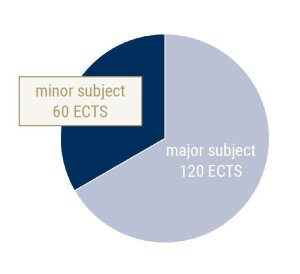- Faculty of Social and Behavioral Sciences
Linguistics
- Degree
- Bachelor of Arts
- Supplement to degree
- minor in a multi-subject bachelor’s programme
- Admission restriction
- without admission restriction (without NC)
- Duration
- 6 Semesters
- Credits/ECTS
- 60
- Teaching language
- German
- Tuition fee
- None
- Semester contribution
- € 305,05
- Start of studies
- Winter semester
- Part-time possible
- Yes
- Institutions
- Faculty of Arts
- Institute of German Linguistics
Programme content
Linguistics is a cross-linguistic science. Various philologies are integrated into the degree programme: German, English, Romance and Slavic Linguistics, Caucasian Studies, Arabic Studies and Indo-European Studies. During your studies, you will acquire both general and language-specific knowledge and skills in synchronous and diachronic Linguistics, theoretical knowledge and practical skills in linguistic communication as well as knowledge of empirical testing of linguistic theories. Possible specialisation languages are: Czech, Russian, Georgian, Arabic, Italian, Romanian and Spanish
Structure
Multi-subject bachelor’s programme
Picture: Sophie BartholomeThe Bachelor's degree is the first professional qualification. The standard period of study|regular programme length is six semesters in total, during which various forms of courses (e.g. seminars, lectures or tutorials) are offered for the individual modules.
A multi-subject Bachelor's degree consists of a major subject with 120 credit points (abbreviation: LP / 1 LP = 30 hours of attendance, preparation and follow-up work|follow-up activity, learning and assessed coursework and examinations) and a supplementary subject with 60 LP.
Why study in Jena?
The different philologies of the Faculty of Arts and Humanities at the Friedrich Schiller University Jena not only offer a wide linguistic diversity, but different traditions also give rise to very different methods in the description and systematisation of patterns in the respective languages and language groups. In addition to a wide range of Germanic, Slavic and Romance languages, non-European languages such as Arabic and Georgian are also represented. The main aim of the interdisciplinary supplementary subject Linguistics is to open up this linguistic and methodological diversity to students interested in languages and linguistics in a flexible structure.
What can you do after your studies?
Career opportunities:
In combination with a suitable major subject, the Bachelor's supplementary subject in Linguistics qualifies students for professions in which cultural, communicative and linguistic competence is central, for example in the subject areas of media, advertising, editing, cultural management, public relations, specialist journalism, adult education, literary and cultural work and theatre. The broadening and deepening of linguistic and linguistic knowledge offered by the supplementary subject Linguistics in combination with a philological major subject creates excellent requirements for further academic qualification in a domestic or foreign master's degree programme in linguistics.
Downloads and links for the degree programme
What are we looking for in prospective students?
The main target group are students who are already studying linguistics in their major subject but are interested in the structures of other languages, including non-Indo-European languages.
Admission requirements
-
University entrance qualification
A university entrance qualification, such as a general secondary school leaving certificate, is required for admission onto the study programme.
More information on university entrance qualifications can be found here.
-
Language requirements
two modern foreign languages or one modern foreign language and Latin, Latin for modules in Romance Studies; proof by the time of registration for the Bachelor's thesis at the latest
Contacts
Fürstengraben 30
07743 Jena
Google Maps site planExternal link
Opening hours:
Mi 11:00-12:30 Uhr
Bachstraße 18k
07743 Jena
Telephone hours:
Mondays and Fridays (9:00 – 11:00)
Wednesdays (13:00 – 15:00)
The ASPA is primarily responsible for students in the Faculty of Social and Behavioural Sciences, the Faculty of Arts and Humanities, and the Faculty of Theology.
Postal address:
Akademisches Studien- und Prüfungsamt
Fürstengraben 1
07743 Jena
Fürstengraben 18
07743 Jena
Google Maps site planExternal link
University Main Building / SSZ
Fürstengraben 1
07743 Jena
Google Maps site planExternal link
Office hours:
We offer consultations in person, by telephone, and via Zoom. You can make an appointment by calling us on +49 3641 9-411111 (Mondays to Fridays from 9:00 to 11:00) or outside these office hours on +49 3641 9-411200. You can also use our remote help desk.
Consultation hours:
Mondays, Tuesdays, Thursdays and Fridays (9:00 to 12:20), Tuesdays (14:00 to 18:00), and Wednesdays and Thursdays (14:00 to 16:00).
Video chat: To the video chat – Zoom Videochat ZeitenMondays to Fridays (12:30 to 13:00) Password ZSB2020 Data protection informationpdf, 101 kb
University Main Building, Room E065
Fürstengraben 1
07743 Jena
Google Maps site planExternal link
Opening hours:
Information Desk (UHG; Room E0.65)
Mondays (10:00 – 12:00)
Tuesdays (13:00 – 15:00)
Wednesdays (10:00 – 12:00)
Thursdays (13:00 – 15:00)
Fridays (10:00 – 12:00)
You can also use our remote help desk at
www.uni-jena.de/service-ssz
or send us your enquiries by post.
Telephone hours:
Mondays to Fridays
(9:00 – 11:00)
Postal address:
Friedrich-Schiller-Universität Jena
Studierenden-Service-Zentrum
07737 Jena
University Main Building
Fürstengraben 1
07743 Jena
Google Maps site planExternal link
